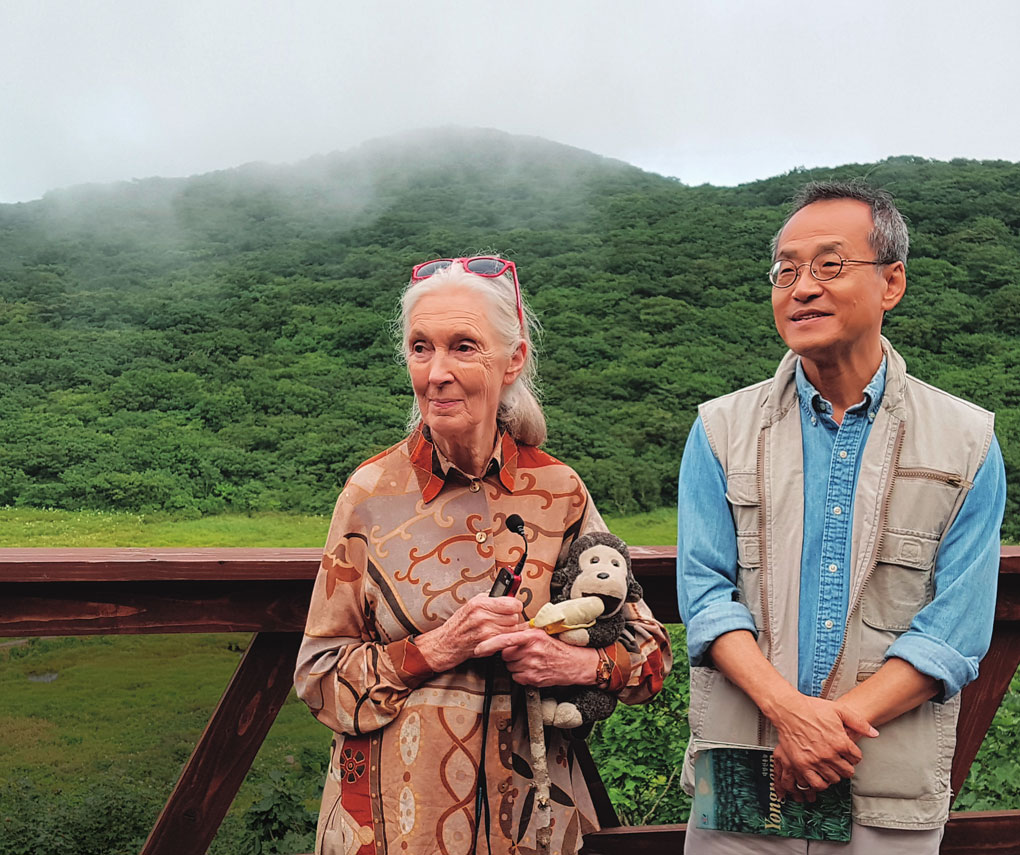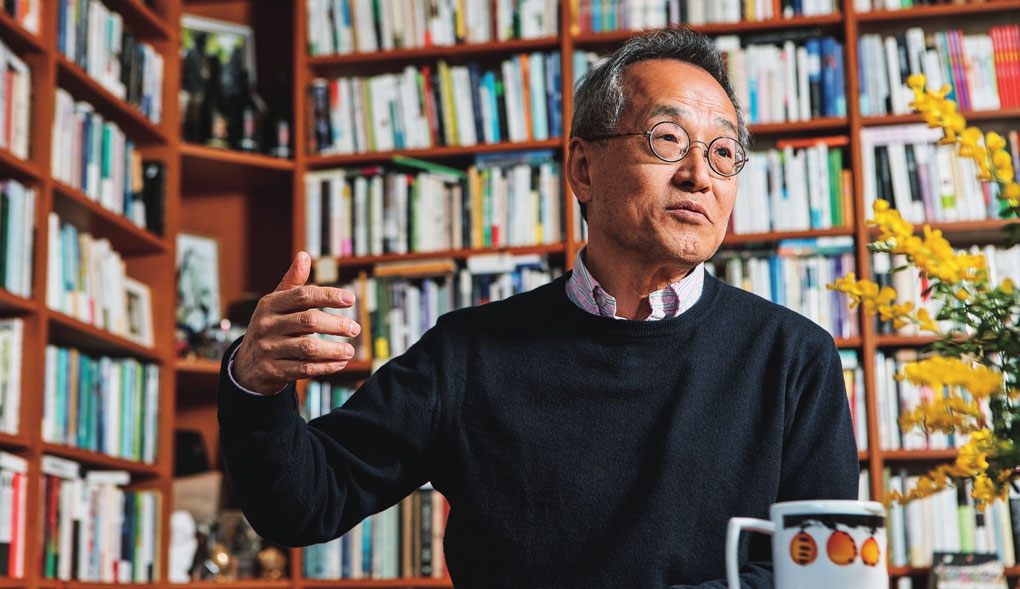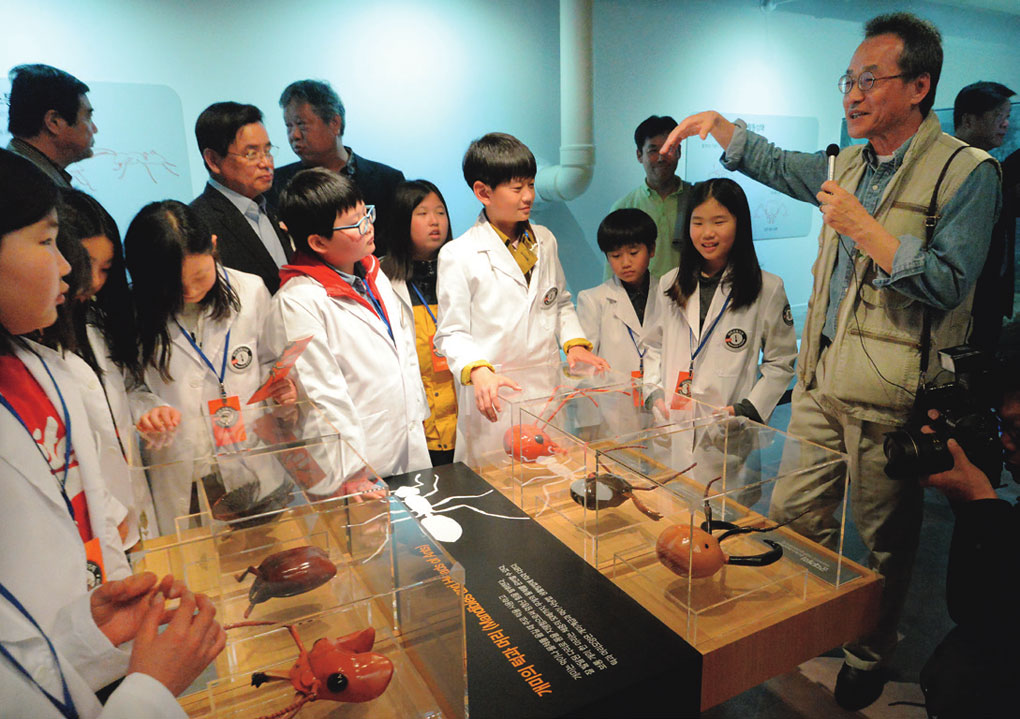Sociobiologist and ethologist, Ewha Womans University ProfessorChoe Jae-chun has long warned against the dangers of destroying ecosystems. As humankind grapples with COVID-19, he predicts a repeat scenario if humans do not begin to better protect the natural world.
“We need to reflect on all the ecological destruction we allowed in the name of economic growth, and repent. It’s actually far more economical to protect nature than to develop it.”

Professor Choe Jae-chun and Dr. Jane Goodall visit Dragon Swamp on Mt. Daeam [Big Rock] in Gangwon Province for a 2017event to promote environmental protection, hosted by the Biodiversity Foundation which they lead. The foundation supports academic research in animal and environmental studies, and development and distribution of educational materials. Dragon Swamp, or Yongneup, is Korea’s first protected wetland registered under the Ramsar Convention. © Cho Soo-jeong
The leafcutter ant is the star of the National Institute of Ecology, located in Seocheon County, South Chungcheong Province. Endemic to the tropical regions of Central and South America, these ants slice off tree leaves, bring them back to their nest, and chew them up into a mixture used to fertilize their fungal gardens. These ants have been farmers far, far longer than humans, who only started domesticating animals and tilling fields some 10,000 years ago.
Close observation of these ants reveals that, as they busily rush about, a number of them are covered in a kind of white powder. This powder is actually a bacterium with antimicrobial properties that sterilizes the pest that attacks the ants’ fungal crops. For millions of years, this has been the symbiosis between leafcutter ant and microorganism.
Professor Choe Jae-chun, ecologist and founding director of the institute, first brought this ant to his workplace. Famously known as the “Ant Doctor,” Choe has long been vocal about his belief that “in order to maintain biodiversity, humanity has to face the climate crisis head on and take action.” On a recent spring day, forsythia in full bloom, I met him at Ewha Womans University.

Professor Choe Jae-chun emphasizes engagement with issues of climate change during an interview at his office on the campus of Ewha Womans University. An advocate of consilience, or the unity of knowledge, Dr. Choe currently teaches and serves at Ewha as chair professor.
You’ve long predicted a viral outbreak like what we’re currently experiencing, right?
As an ecologist who studies both ecology and evolution, it was impossible not to be worried about trouble brewing between human beings and viruses. Let us first acknowledge what must be acknowledged: if humans and viruses compete against each other, there’s just no way for humans to emerge victorious. Viruses have existed on earth for far longer than human beings, and at this very moment there are countless strains all across the planet, coiled and ready to strike. Among them are those that, given the chance, will do their best to mutate in order to make human beings a suitable host. Most fail. But what’s happened now is this: a shockingly canny one has revealed itself. Easy to spread even when symptoms are still weak, but with a mortality rate that is not too terribly high – and, with humans as its host, it has managed to spread itself all over the world.
What can be done to resolve this pandemic situation?
Humankind will find a way to overcome this particular pandemic. The bigger problem is that this will not be the last. There will be an endless stream of new viruses seeking to make hosts out of humans. So even if we manage to make a vaccine for this strain of coronavirus over the next 18 months, there is a chance that by the point that vaccine actually reaches us, another virus will have appeared.
Then what must humankind do?
We need fundamental countermeasures that can be used against the spread of all viruses. I would like to call these “eco-vaccines” and “behavior vaccines.”
A behavior vaccine sounds like intensified “social distancing.”
That’s right. Social distancing is a great example of an excellent behavior vaccine. This might sound overly simple, but if we could just put the whole world on complete hold for exactly two weeks – no more – then all avenues for the further spread of COVID-19 would be blocked and the only work left for us to do would be to treat those already infected. If the world could just come to an agreement and everyone could stop, together, all at once – well, there could actually be no more effective vaccine than that.
Does eco-vaccination mean an end to the reckless destruction of ecosystems that has long been committed by humankind?
That’s exactly right. The reason that viruses are continuously attacking human beings is that so many of the viruses’ previous host animals and their natural ecosystems have disappeared. For a long time, there was no occasion for a virus living in a bat in a forest cave to ever encounter a human being. There was really no reason for bats, or civets, or camels, or pangolins to initiate contact with us at all. That is only the result of forests being destroyed, and wild animals being captured and bred for food – all of these practices becoming commonplace. From now on, we need to leave wild animals alone so that viruses can’t make that jump. This is why climate change and the resulting disappearance of biodiversity are both interconnected with the spread of viruses.

Professor Choe explains the ecology of ants to a group of elementary schoolers touring a special exhibition on the life of ants, held at the National Institute of Ecology in 2015. © Munhwa Daily
Humankind has treated ecological destruction as part of economic growth.
That’s the problem. We were so busy chasing economic growth that we never considered ecological destruction to be an issue. But what is the situation we must deal with now as a result? The entire global economy has come to a halt because of this viral outbreak, and unimaginable damage is being done. We need to reflect on all the ecological destruction we allowed in the name of economic growth, and repent. It’s actually far more economical to protect nature than to develop it. And we must understand that an eco-vaccine is the most basic prescription for blocking another viral outbreak.
Do you think this could be an opportunity for us to take a different path?
How could it be? Humans are forgetful animals. Once the pandemic is over, there will be people who go right back to living as they did before. But there’s also no doubt that this pandemic will become a moment of ecological awakening, and the number of people moved to action will gradually increase – one or two at a time. These people’s actions must come together to lead the way to meaningful change.
As for a behavior vaccine, it seems social distancing will need to become permanent.
Humans are the only animals on earth that have evolved in the direction of free exchange with large numbers of unknown individuals of the same species. Even if 20-30 strangers are sitting in a Starbucks, we can enter the space alone, without fear. What do you think would happen if such a thing occurred in the world of chimpanzees? The chimpanzee group would attack, and the outsider would be dead in less than a minute. The same goes for the world of ants. Sure, this virus means that we humans may keep giving each other some distance for a while, but I don’t believe that such precautions will last forever. As much as we are the fruits of a marvelous process of evolution, we will continue to group together, and meet, and touch. Of course, if a pattern of viral outbreaks continues, we’ll have to repeat the whole process of distancing each time. We’ll part ways a while and meet again, and likely love and appreciate each other that much more.
Campuses have closed and lectures have gone online. How are you spending your time?
This is the most free time I’ve had in years. Most of the planned lectures and conferences, both here and abroad, have been canceled. I’m meeting my students through online lectures and enjoying this unexpected space. I’ve actually been able to make a great deal of progress on a book manuscript I’d been putting off because of my busy schedule – I’m almost done.
What is your next book about?
It’s a book that teaches you how to be good at discussion. It seems like a bit of a stretch for an ecologist, doesn’t it? But actually, that’s not the case. Many animals in the natural world can learn. But among all those countless learning animals, only we humans have become “lords of all creation.” The key reason for that is the fact that humans are animals that carry their starting line around with them.
Animals that carry their starting line?
Among all the animals, humans are the only ones who record their accumulated knowledge and pass it down. Each generation of human beings moves their starting line precisely as far as the achievements of the previous generation, then starts from that point, further along. We are the only species that does this. So the most important task for us humans is to learn from the generations that came before us, and to trust each other and share that knowledge. And in order to do all this, we must be good at discussion and debate. This is the reason an ecologist became interested in how to become a better debater.
It would be nice if this pandemic could positively affect humankind’s moveable starting line.
Dr. Jane Goodall, who always speaks of hope, said something to me recently when we were in touch. “Good things will happen, too,” she said. “We’ve already been through this a few times now. Maybe now, people will begin to see that it’s actually good for us to leave nature alone, just as it is, as much as possible; maybe now, those calculations will start to make sense for them.” And I truly hope that is what happens.
Kang Yang-guScience Journalist
Heo Dong-wukPhotographer